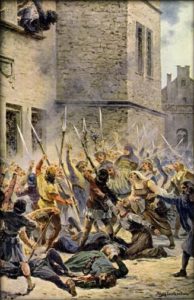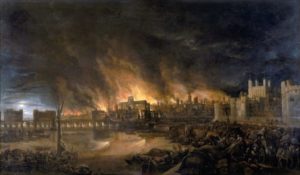“The man who does not read good books has no advantage over the man who cannot read them.”
According to Nietzsche
“In individuals, insanity is rare; but in groups, parties, nations, and epochs it is the rule.”
According to Lou Reed
” Life is like Sanskrit read to a pony”
September 2
459 St Simeon Stylites dies. Simeon was an ultra-ascetic Syrian monk, famous for having spent decades living atop a pillar, praying and preaching to the crowds who came to the desert to hear him. His example was widely-imitated for a time.
1192 Treaty of Jaffa between Richard and Saladin ends Third Crusade. Saladin’s capture of Jerusalem in 1187 sparked the Third Crusade which was to have been a joint venture led by the three great leaders of western Christendom: Frederick I Barbarossa, the Holy Roman Emperor; wily Philip Augustus of France; and Europe’s greatest warrior, Richard the Lionheart of England. Frederick died en route to the Holy Land and most of the German contingent turned for home. Philip weaseled out of his commitment early and returned to France to undermine Richard’s holdings in that country, leaving the English king with a much reduced force. He was able to defeat Saladin in open battle but lacked the resources to recapture Jerusalem. The treaty allowed for access of Christian pilgrims to Jerusalem and confirmed crusader holdings along the Mediterranean coast.
1415 Furious at the execution of Czech reformer John Hus by the Council of Constance, despite an imperial safe-conduct, an assembly of Bohemian and Moravian nobles sent the Protestatio Bohemorum, a letter of protest to the Council, vowing they would fight to maintain their religious rights. This would lead to the great Hussite Rebellion which raged from 1419 to 1433. The Czech reforming factions would defeat five Catholic crusades sent against them before agreeing to the Compacta of Prague which allowed some moderate ritual changes, especially the administration of both bread and wine to the congregation during the Mass.
1666 Great Fire of London starts. Among its architectural victims was Old St Paul’s Cathedral, a Gothic structure built from the 11th to the 13th century with a spire almost 490’ (149 m) tall. Its destruction led to the construction of a replacement designed by Sir Christopher Wren in the neoclassical style with a massive dome. Wren’s building was completed on Christmas Day 1711 and survived the German aerial Blitz during World War II.
According to Lily Tomlin
“Forgiveness means giving up all hope for a better past.”
O God Our Help in Ages Past
Though this hymn by Isaac Watts (which paraphrases Psalm 90) predates the Victorian era, its steadfast confidence certainly sounds Victorian. As schoolchildren we used to sing it every Remembrance Day.
O God, our help in ages past,
Our hope for years to come,
Our shelter from the stormy blast,
And our eternal home.
Under the shadow of Thy throne
Thy saints shall dwell secure;
Sufficient is Thine arm alone,
And our defence is sure.
Before the hills in order stood,
Or earth received her frame,
From everlasting Thou art God,
To endless years the same.
A thousand ages in Thy sight
Are like an evening gone;
Short as the watch that ends the night
Before the rising sun.
Time, like an ever rolling stream,
Bears all its sons away;
They fly, forgotten, as a dream
Dies at the opening day.
Our God, our help in ages past,
Our hope for years to come,
Be Thou our guard while trials last,
And our eternal home.
Recessional
Rudyard Kipling (1865-1936) outlived the Victorian era, but his verse always reflects the values of the reign of that great Queen. Though this was written in 1897 for Victoria’s Diamond Jubilee, it sounds a cautionary note about the impermanence of human empires and bids the British be humble.
God of our fathers, known of old,
Lord of our far-flung battle line,
Beneath whose awful hand we hold
Dominion over palm and pine—
Lord God of Hosts, be with us yet,
Lest we forget—lest we forget!
The tumult and the shouting dies;
The Captains and the Kings depart:
Still stands Thine ancient sacrifice,
An humble and a contrite heart.
Lord God of Hosts, be with us yet,
Lest we forget—lest we forget!
Far-called our navies melt away;
On dune and headland sinks the fire:
Lo, all our pomp of yesterday
Is one with Nineveh and Tyre!
Judge of the Nations, spare us yet,
Lest we forget—lest we forget!
If, drunk with sight of power, we loose
Wild tongues that have not Thee in awe,
Such boastings as the Gentiles use,
Or lesser breeds without the Law—
Lord God of Hosts, be with us yet,
Lest we forget—lest we forget!
For heathen heart that puts her trust
In reeking tube and iron shard,
All valiant dust that builds on dust,
And guarding calls not Thee to guard,
For frantic boast and foolish word-
Thy Mercy on Thy People, Lord!
Battle Hymn of the Republic
A hymn that combines martial ardor and the claim of godliness for the Union cause in the American Civil War, the “Battle Hymn of the Republic” was written by Julia Ward Howe for Atlantic magazine in 1862. The tune, originally a folk melody, had recently been applied to “John Brown’s Body”, about the executed Kansas anti-slaver.
Mine eyes have seen the glory of the coming of the Lord;
He is trampling out the vintage where the grapes of wrath are stored;
He hath loosed the fateful lightning of His terrible swift sword:
His truth is marching on.
(Chorus)
Glory, Glory, hallelujah!
Glory, glory, hallelujah!
Glory, glory, hallelujah!
His truth is marching on.
I have seen Him in the watch-fires of a hundred circling camps,
They have builded Him an altar in the evening dews and damps;
I can read His righteous sentence by the dim and flaring lamps:
His day is marching on.
(Chorus)
I have read a fiery gospel writ in burnished rows of steel:
“As ye deal with my contemners, so with you my grace shall deal”;
Let the Hero, born of woman, crush the serpent with his heel,
Since God is marching on.
(Chorus)
He has sounded forth the trumpet that shall never call retreat;
He is sifting out the hearts of men before His judgment-seat;
Oh, be swift, my soul, to answer Him! Be jubilant, my feet!
Our God is marching on.
(Chorus)
In the beauty of the lilies Christ was born across the sea,
With a glory in His bosom that transfigures you and me.
As He died to make men holy, let us die to make men free,
While God is marching on.
(Chorus)
Lead, Kindly Light
This poem by John Henry Newman became a favourite hymn, famously sung amidst many disasters, including on the lifeboats of the “Titanic”, in Ravensbruck concentration camp, and by trapped miners underground
“Lead, Kindly Light, amidst th’encircling gloom,
Lead Thou me on!
The night is dark, and I am far from home,
Lead Thou me on!
Keep Thou my feet; I do not ask to see
The distant scene; one step enough for me.
I was not ever thus, nor prayed that Thou
Shouldst lead me on;
I loved to choose and see my path; but now
Lead Thou me on!
I loved the garish day, and, spite of fears,
Pride ruled my will. Remember not past years!
So long Thy power hath blest me, sure it still
Will lead me on.
O’er moor and fen, o’er crag and torrent, till
The night is gone,
And with the morn those angel faces smile,
Which I have loved long since, and lost awhile!
Meantime, along the narrow rugged path,
Thyself hast trod,
Lead, Saviour, lead me home in childlike faith,
Home to my God.
To rest forever after earthly strife
In the calm light of everlasting life.”
Praise My Soul the King of Heaven
Here is another classic by the Scottish Anglican priest Henry Francis Lyte.
- Praise, my soul, the King of Heaven;
- To His feet thy tribute bring.
- Ransomed, healed, restored, forgiven,
- Who like me His praise should sing:
- Alleluia! Alleluia!
- Praise the everlasting King.
- Praise Him for His grace and favour
- To our fathers in distress.
- Praise Him still the same as ever,
- Slow to chide, and swift to bless.
- Alleluia! Alleluia!
- Glorious in His faithfulness.
- Fatherlike He tends and spares us;
- Well our feeble frame He knows.
- In His hands He gently bears us,
- Rescues us from all our foes.
- Alleluia! Alleluia!
- Widely yet His mercy flows.
- Frail as summer’s flower we flourish,
- Blows the wind and it is gone;
- But while mortals rise and perish
- Our God lives unchanging on,
- Praise Him, Praise Him, Hallelujah
- Praise the High Eternal One!
- Angels, help us to adore Him;
- Ye behold Him face to face;
- Sun and moon, bow down before Him,
- Dwellers all in time and space.
- Alleluia! Alleluia!
- Praise with us the God of grace.



